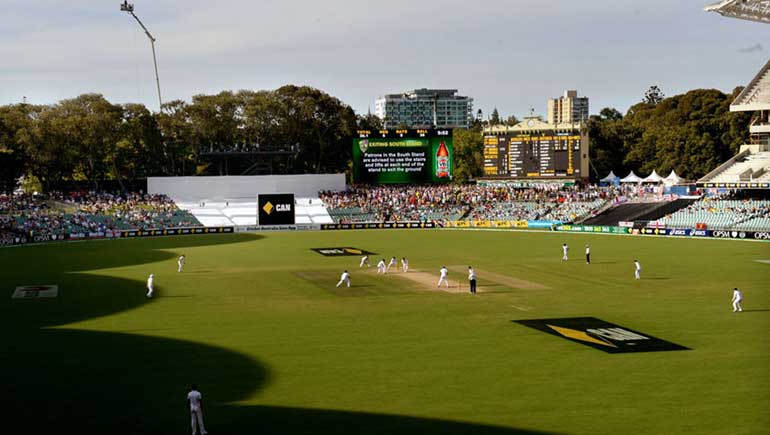Monday Feb 23, 2026
Monday Feb 23, 2026
Wednesday, 10 August 2016 00:05 - - {{hitsCtrl.values.hits}}
 The advent of drop-in pitches at venues like the Adelaide Oval and the MCG has militated against the diversity of
The advent of drop-in pitches at venues like the Adelaide Oval and the MCG has militated against the diversity of
conditions – PA Photos
ESPNcricinfo: As he ponders changes to Australia’s badly malfunctioning top order, Coach Darren Lehmann has admitted that increasingly homogenised domestic pitches – and drop-in wickets at multipurpose stadiums – have played a role in stunting the adaptability of batsmen.
When Lehmann and his contemporaries were learning their trade, each major venue had a pitch of unique character, from the bounce of Perth to the seam of Brisbane to Adelaide’s something-for-everyone, Sydney’s spin and Melbourne’s variable bounce. However the contrasts have diminished in recent years, not helped by the installation of drop-in pitches at the MCG, the Adelaide Oval and, soon, Perth’s new stadium.
Another factor over time had been the preparation of increasingly friendly pitches for seam bowlers to aid each state’s bid for the Sheffield Shield, followed by a reverse directive from the team performance manager Pat Howard for flatter surfaces. While the number of runs scored in Australian first-class competition has risen, batsmen are clearly not facing the same challenges that so confounded them in Kandy and Galle.
“I think we have said for a while that we would like the Shield wickets to go back a little bit in time where they are all different,” Lehmann said. “You had Perth which was grassy and bouncy and went through and swung, and Brisbane seamed and Adelaide reversed and spun and Sydney spun from day one.
“All those things we would love to see happen, but the problem we’ve got now is we’ve got drop-ins at a couple of grounds, so it’s hard to do. You would love that to be the case but you are living in a different world and so it’s a bit harder. In terms of Test wickets, whatever we get we’ll trust the curators to do the best they can. I think you see it has been pretty fair in Australia for a couple of years but there is no reason it can’t improve either.”
Groundsmen in Australia are hard at work trying to find ways to improve the variety of pitches they can prepare. Adelaide Oval’s head curator Damian Hough is at the forefront of experimentation with moveable surfaces, developing more porous drop-in trays that allow moisture to escape and so create the right environment for the pitch to deteriorate. Last year Adelaide provided a pitch made more or less to order for the use of the pink ball in the inaugural day/night Test.
The desire to change and improve has been visible in the flurry of thoughts around the Australian team over the past few days, starting with a team decision to play more proactively in the second innings in Galle. This was most dramatically shown by Adam Voges, who repeatedly tried the reverse sweep to break up the line of the spinners, before falling to the same shot.
“We have had those discussions already,” Lehmann said of the brainstorming that led to Voges’ innings. “It’s probably him going ‘I have to change’, thinking he can play a certain way, and change in other ways. So, that’s learning the game, isn’t it, and trying to adapt. But being proactive is the key to having good success in the subcontinent, not being reactive.”
Lehmann said he agreed with the captain Steven Smith’s contention that the selectors needed to choose batsmen more suited to the prevailing conditions in future. However, he also added that if this were so, public and media perceptions needed to change, given the fact that no member of the current squad “deserved” to be missing from the Sri Lanka squad given their performances last summer.
“Totally agree,” Lehmann said of Smith’s suggestion. “The interesting thing, though, if you have a look at our summer and the way our batters played, if we didn’t take any of those batters, how would we be viewed in the press? It’s always tough. We haven’t had the success, now we have to look outside the square.”
Shaun Marsh is in contention to come into the Test XI for Colombo, as a top-order batsman with a decent record against spin and runs on his last visit to Sri Lanka in 2011. None of Joe Burns, Usman Khawaja or even Voges could have too many complaints were they omitted for the third Test, a decision Lehmann said would not count against their chances of being chosen again on more familiar home turf.
“Everyone in the squad will be considered, that’s what happens when you don’t have the results you would like, we will need to have a look at the wicket, sum it up and go from there,” Lehmann said. “You don’t like dropping anyone, you feel for them when they don’t play as well as they would like. That’s the hardest thing as a coach and a selector – you have to make tough decisions sometimes.
“We are playing a Test match in tough conditions; [we will] pick the best XI for that and then worry about the summer when we get home. It won’t hold against anyone, this is a squad that we think is right. Obviously results show different and say different but we have to make sure we are picking the best XI to play.”